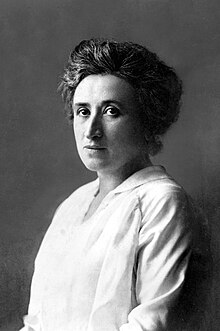Rosa Luxemburg

Rosa Luxemburg (5 March 1871 in Zamość, Russian Poland – 15 January 1919 in Berlin) was a Polish-Jewish Marxist politician working in both Poland and Germany. Her birth name was Rosalia Luxemburg. She was born into a Jewish family. She was the fifth child of her parents. Her father was a wood trader/timber trader. His name was Eliasz Luxemburg III. Her mother's name was Line (maiden name: Löwenstein).
Publications[change | change source]
In one of her earliest publications, 'Reform or Revolution?' (1900) Luxemburg accepted Marx's argument that capitalism promoted exploitation and was at odds with humanity's natural, fraternal instincts. She also agreed that evolutionary socialism was impossible: only revolution could create real change. However, like Lenin, she had little sympathy for Marx's 'historicism' and denied that for a revolution to occur, capitalism would have to reach an advanced stage of development. However, Luxemburg's analysis of how the revolution should come would distinguish her from both Marx and Lenin.
Life[change | change source]
After WW1 Luxemburg helped establish the German Communist Party (KDP). She organised a socialist uprising in Germany but was killed by a right-wing group called the Freikorps. Rosa Luxemburg made many new communist ideas that continue to influence communism today. Rosa Luxemburg supported the Russian Revolution led by Lenin and Trotsky, but she saw them both as making undemocratic mistakes in organizing what was supposed to be a more democratic nation. She also insisted the freedom of assembly, freedom of the press, freedom of speech and abolition of death penalty. In 1913 she published an essay "The Accumulation of Capital" that urges that capital accumulation causes the imperialism.
Murder[change | change source]
Rosa Luxemburg was assassinated by the Garde-Kavallerie-Schützendivision of the Freikorps.
- 1871 births
- 1919 deaths
- 19th-century German philosophers
- 20th-century German philosophers
- Executed German people
- German communists
- Assassinated German politicians
- Jewish atheists
- Jewish feminists
- Jewish German politicians
- Jewish philosophers
- Marxists
- Murders by firearm in Germany
- Polish Jews
- 20th-century Polish philosophers
